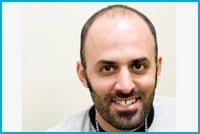For Suhail Abu al-Sameed it was the first time in years he had been nervous about being out.
But for the Toronto Muslim homosexuality was something delegates at November’s International Consultation on Islam and HIV/AIDS in South Africa couldn’t ignore any longer.
“I was shaking, out of my element, at the end of the world,” says Abu al-Sameed in an interview in his office at the Sherbourne Health Centre where he is the coordinator of Supporting Our Youth’s Newcomer/Immigrant Youth Project. “I told them, ‘I as a gay Muslim feel very unsafe in this room. If I ever get AIDS you’re the first people I would lose. I wouldn’t come to you because you don’t care about me.'”
Abu al-Sameed says he was giving his speech directly in front of a table of religious scholars, who had earlier condemned homosexuality. Two of them tried to silence him by waving their arms but Abu al-Sameed continued and the result, he says, was astonishing.
“As I walked back to my chair there were people reaching for my hand, saying, ‘Good work.’ One very big, very serious bearded religious man put his hand on my shoulder and said, ‘I’m very sorry if I said anything that offended you.'”
Even more surprising was the statement issued the next day by the religious leaders and scholars at the conference saying that although Islam does not accept homosexuality, Islamic leaders would try to help create an environment in which gay people could approach social workers and find help against AIDS without feeling unsafe.
“It’s the first time a religious group has said that,” says Abu al-Sameed. “They were able to put a face to homosexuality. The moment they met someone something changed drastically. I reached people from all over the world, people of authority.”
Abu al-Sameed doesn’t expect things to change overnight in Islamic countries but he says having religious leaders speak out is a huge first step. He says the result is being felt well beyond the conference.
“I got an email from one of the people I work with here, young, Muslim, in the closet,” says Abu al-Sameed. “He was saying, ‘Oh my God, you changed my life. I can do something about it.”
Abu al-Sameed had attended the conference — a groundbreaking consultation that brought together Muslim community leaders, academics, doctors, relief workers and HIV-positive activists — as part of a research study he is helping to start in Toronto. The study — which springs from a group Abu al-Sameed helped found called the Muslim AIDS Project — will be called Looking For Answers: HIV and AIDS in the Muslim Community in the GTA.
“We’ll be looking at attitudes,” says Abu al-Sameed. “We’re trying to start a dialogue with religious leaders and Muslim PHAs [people with HIV/AIDS]. We want to know if we were to start an awareness campaign would your mosque be part of it or would you say, ‘No way.'”
He says that being able to point to the statement issued by religious leaders the conference will be a huge help.
Abu al-Sameed says that while numbers are still low in Muslim communities both in Canada and the Middle East, the rate of infection is growing.
“The growth rate of these numbers is the alarming thing,” he says. “The prevention work has not kept up. These people are coming to Canada with a sense of immunity.”
Abu al-Sameed says about 10 to 20 percent of those he works with in the Newcomer/ Immigrant Youth Project are Muslim. Not all of those are queer, but he says there are queer Muslim refugees entering Canada on a regular basis.
“Most of them are easily accepted,” he says. “If you’re coming from Iran or Saudi Arabia you’re probably going to be accepted.”


 Why you can trust Xtra
Why you can trust Xtra


